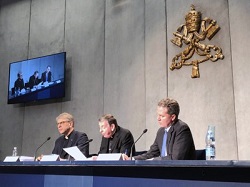
Contact: Media Office, World Council of Churches, +41 79 507 6363
GENEVE, March 2, 2018 /Christian Newswire/ -- The Vatican and the World Council of Churches today announced that Pope Francis will visit the WCC this June.
Photo: Rev. Dr Olav Fykse Tveit, Cardinal Kurt Koch and Mr Greg Burke, director of the Holy See Press Office during the press conference. Photo by Marianne Ejdersten/WCC
The formal announcement took place on 2 March at a joint press conference in the Vatican with Cardinal Kurt Koch of the Roman Catholic Church, president of the Pontifical Council for Promoting Christian Unity and Rev. Dr Olav Fykse Tveit, general secretary of the World Council of Churches.
The landmark visit, to take place on 21 June, is only the third by a pope, and the first time that such an occasion was dedicated to visiting the WCC.
As Pope Francis begins the fifth year of his papacy, the WCC is marking its 70th anniversary, and the pope's visit will cap celebrations of the ecumenical legacy and renewal of its promise.
A sign of hope
Said WCC general secretary Rev. Dr Olav Fykse Tveit, "The news of the pope's visit to the WCC and to Geneva is a sign of hope for all who long for unity, peace and justice in a broken and divided world. It is a sign of how Christian churches can affirm our common calling and mission to serve God together. And it is an affirmation of our shared focus on the need of our fellow human beings, and to do together what we can do together for reconciliation and unity among the churches and in the world."
"That the pope's visit occurs on the occasion of the 70th anniversary of the WCC is a recognition of those who have prayed and worked together for many years for the unity of the Church. It is a significant sign of how far we have come in those years, through the work of the WCC and in cooperation with the Roman Catholic Church, and now under leadership of Pope Francis."
Tveit also sees the visit as "a great encouragement for those who are ready to continue this journey of faith, as pilgrims seeking unity, justice and peace—using our faith and our religious life as a way to build bridges and give hope for a better future together."
Shared vision of ecumenism
The visit highlights the shared vision of Francis and the WCC for practical ecumenical engagement, as the WCC continues to engage churches and others everywhere in concrete action through its Pilgrimage of Justice and Peace, closely paralleling and collaborating with recent activities of the Vatican.
The World Council of Churches is a fellowship of 348 member churches—nearly all the Orthodox churches, along with dozens of Anglican, Lutheran, Methodist, Reformed, and other churches—that together represent roughly half a billion Christians around the world.
The WCC has been for 70 years the chief instrument of the ecumenical movement among Christians to overcome historic divisions, witness together to their faith, advocate jointly for social justice, and to work in a coordinated way for justice and peace.
Pope Francis has proved not only an inspirational figure but also one who is reframing notions of the church's mission, Christian discipleship, and Christian responsibility. Deeply critical of the international economic order and of environmental threats, he has championed an integral approach to the economy, the earth and the poor.
On the ecumenical front, Francis has accented solidarity in action for the poor as a way of nurturing ecumenical fellowship, along with shared witness to the joy of the gospel and the promise of social justice.
Francis has developed close ties with the Ecumenical Patriarch, Bartholomew I, entered into joint programming with the Archbishop of Canterbury against human trafficking, and forged an agreement with Coptic Pope Tawadros II for mutual recognition of baptism.
Even before and since the Second Vatican Council, the Catholic church and the WCC have worked closely together. Their Joint Working Group in 2015 marked its 50th year, and the Vatican is an active participant in the chief programmes and all the commissions of the WCC, though not a member of the WCC.
Collaboration in programmes
In recent years, many of the programmes of the WCC and the Vatican have aligned directly, and the two bodies have collaborated closely on such issues of climate change, peace-making in war-torn countries, migration and refugees, interreligious cooperation, and of course ecumenical relations and deepening convergent theological understandings of church, mission, and diakonia or service.
"We are really growing together," said WCC general secretary Rev. Dr Olav Fykse Tveit.
Pointing to a most recent example, he said, "I am very pleased, for instance, with the present cooperation with the Dicastery for Promoting Integral Human Development with the leadership of Peter Cardinal Turkson. We are planning a joint conference on Xenophobia, Racism and Populism in September this year."
Noting the strong synergy and shared vision across a range of activities, Tveit said: "The growing relations between the Roman Catholic Church and the fellowship of churches of the WCC are a real sign of hope—and not just for churches. Hope is critical for people suffering in so many places from the consequences of injustice, violence and war…. Let us pray that the visit of Pope Francis to the WCC will be such a sign of hope and common station in our shared Pilgrimage of Justice and Peace, walking, praying and working together."
Press Office of the Holy See
Video recording of the press conference
WCC's Joint Working Group with the Roman Catholic Church
More about the WCC's 70th anniversary

